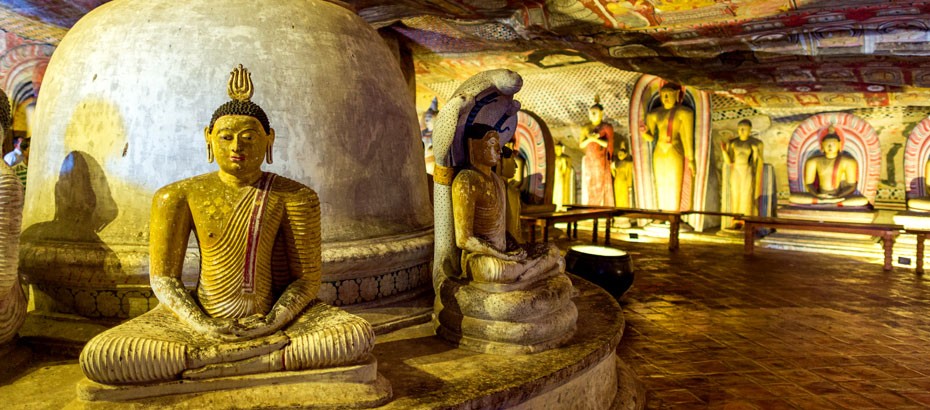
Discover the Past
Sri Lanka is known for its rich Buddhist culture and history and offers many places of religious and historic significance.
Anuradhapura
A central Buddhist city, holding many Temples and Stupa. The city offers pilgrims a religious experience.
Temple of Tooth
Known as Dalda Maligawa is located in the city of Kandy. It is one of the most sacred Buddhist pilgrimage sites and houses the sacred tooth of Lord Buddha. The tooth was said to be taken from the flames of Buddha’s funeral pyre in 543 BC and was smuggled into Sri Lanka during the 4th century AD, hidden in the hair of princess.
The temple took nearly 100 years to construct. The construction was started in 1687 and finished in 1782. It is an imposing pink-painted structure, surrounded by a deep moat. . Daily rituals are performed three times a day-at 4.30 a.m., 10.30 a.m and 6.30 p.m. respectively. Person wearing shorts is not allowed to enter in this temple and shoes must be removed before entering.
Kataragama
A popular place of pilgrimage for the Hindu, Buddhist, Muslim and indigenous Vedda communities of Sri Lanka and South India. The god Muruga is the main deity.
Adam’s Peak
A 2,243 metres (7,359 ft) tall conical mountain located in central Sri Lanka. It is well-known for the Sri Pada “sacred footprint”, a 1.8 m rock formation near the summit, in Buddhist tradition held to be the footprint of Buddha, in Hindu tradition that of Shiva and in Muslim tradition that of Adam.
Bogoda Bridge and the Temple
An ancient temple and wooden bridge, which lies some 30km from Bandarawela and 10 km from Badulla, off the Hali-ela junction. Believed to be the oldest surviving wooden bridge in the world, the Bogoda Bridge dates back to the 1600s, but the temple just by it, has a much longer history, going back to the 1st century BC. The bridge built across the Gallanda Oya is on an ancient route, which linked Badulla and Kandy. The bridge is elegantly supported by 11 pairs of elegantly carved pillars and a railing of banisters.
Buduruwagala
Located 5km south of Wellawaya. Literally it means images of Buddha. The complex consists of seven statues and belongs to the Mahayana school of thought. The statues date back to 10 century AD. The gigantic Buddha statue still bears traces of its original stuccoed robe and a long streak of orange suggests it was once brightly painted. The central of the three figures to the Buddha’s right is thought to be the Buddhist mythological figure-the Bodhisattva Avalokitesvara. To the left of this white painted figure is a female figure in the thrice-bent posture, which is thought to be his consort-Tara.
Dowa Cave Temple
Located 6km from Bandarawela on Badulla-Bandarawella highway. Nestled amidst the hills, the historic cave temple complex was the sanctuary for King Walagamba. The temple has a beautiful ornamental gateway and a 38 ft Buddha image sculptured from a rock. Some paintings, belonging to the Kandyan era, and which depict various Jataka stories are also sited.
Maligawila
Located about 15 km to the south of Monaragala. It is popular for the two colossal statues of Buddha, which date back to 7th century AD. Both statues are carved from crystalline limestone. One of the statues is 11m high and is considered to be the world’s largest free standing Buddha figure.
Dambegoda
Approx. 1km from Maligawila and has another statue of Buddha, which is 10m high and called Avalokitheswara Bodhisattva. This is believed to be a divine being who chooses to reside on the human plane to help ordinary people attain salvation.Muthiyangana is one of the sixteen most venerated religious places for Buddhists in Sri Lanka. It has a shrine, built in 4 century AD, and houses the jaw-bone of Lord Buddha. It is believed that the Lord Buddha personally blessed this site during one of his three visits to Sri Lanka.
Pada Yatra
One of Lanka’s oldest traditions is the Pada Yatra foot pilgrimage from Jaffna to Kataragama along the East Coast. The origins of the Yatra are shrouded in myth. Several versions declare that it began with God Kataragama himself when he landed somewhere on our shores and walked to Kataragama.
Over the centuries this multi-religious 45-day (from Mullaittivu) pilgrimage to Kataragama has become a Sri Lankan institution. Villages en-route participate by providing refreshments, meals, hospitality and accommodation to the pilgrims, whom they regard as the god’s messengers. For centuries pilgrims from India and beyond have also been ‘called’ to Kataragama.
Revived in 1988 by the Kataragama Devotees Trust and Cultural Survival today over 10,000 attend the pilgrimage annually. No innovations have been tolerated by these pilgrims who insist that the only way to know the tradition is to live the tradition.


